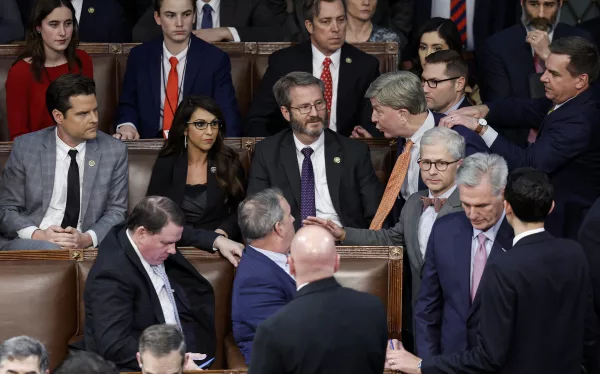Dysfunction in American politics is a tale as old as time, and with an oft-stalling two-party structure, a heavily criticized electoral system, and increasing polarization, many are pessimistic about the republic’s political future. According to a recent poll, a mere 4% of U.S adults say that the political system is working “extremely or very well”, with 65% of respondents saying that they “always or often feel exhausted when thinking about politics”.
Over the past few weeks, the U.S. Congress once again appeared to hit a roadblock, with the fight over the next Speaker of the House of Representatives front and center on the political stage. The ongoing fracture began on 3 October, when Representative Kevin McCarthy of California’s 20th District was voted out as Speaker of the House by a majority of his colleagues, starting a scramble for a new Republican Majority Leader. McCarthy had been heavily criticized by his Republican peers in the lead-up to the vote, primarily due to a lengthy delay in passing a bill to fund the federal government, prompting fears of a government shutdown. McCarthy’s proposals were roundly dismissed by House Republicans, who called for another $120 billion (€113 billion) in cuts, coupled with stricter legislation to limit unlawful immigration at the country’s Southern border with Mexico. Chief among these critics was Florida’s Rep. Matt Gaetz, the motion’s orchestrator, who claimed that McCarthy had been engaged in a “brazen, repeated material breach” of an unofficial deal made with House conservatives back in January in order to gain initial support.
McCarthy’s position as Speaker of the House has been tenuous since he assumed office at the beginning of this year: despite serving in various leadership positions since 2009, McCarthy’s appointment took 15 rounds of voting before it finally passed, largely due to a revolt by a bloc of far-right House Republicans who demanded concessions from the would-be Speaker that would diminish his powers, including making it easier to launch investigations into the executive branch. The process dragged out over a tense 5-day floor fight during which Gaetz and another Republican Representative, Alabama’s Mike Rogers, had to be physically separated from one another. Since the tumultuous start to McCarthy’s Speakership, a feeling of distrust and skepticism has been ever-present between the Speaker and rank-and-file Republicans.

These tensions flared up over the summer and came to a breaking point at the beginning of October when Rep. Gaetz introduced the motion to oust McCarthy as Speaker. Since McCarthy’s removal, Rep. Patrick McHenry of North Carolina has been serving as Speaker pro tempore, which he will do until another Speaker is selected by the Republicans. This process, however, has not been as simple as it traditionally is, with various factions within the party all competing for their interests.
Initially, it seemed as though the vacancy left by McCarthy’s departure would be assumed by one of two Republicans: Rep. Jim Jordan of Ohio – backed by former President Donald Trump – or Rep. Steve Scalise of Louisiana, who both announced their candidacies the day after his removal. Scalise, however, withdrew from the race the following week due to insufficient support. After becoming the clear frontrunner, Jordan was unable to secure a majority during the first vote and failed again the following day, prompting the leaderless Republicans to reconsider their candidate. Jordan was dropped at the end of the week, and it was decided on 22 October that there would be nine further candidates seeking the Speakership.
Rep. Tom Emmer of Missouri and House Majority Whip emerged as a favorite from this pack, narrowly defeating Louisiana’s Rep. Mike Johnson in a closed-door ballot. However, mere hours after securing the nomination, Emmer dropped out of the race, following noteworthy Republican dissent and scathing criticism from Trump, who called Emmer’s potential speakership a “tragic mistake”. Emmer’s withdrawal opened up a path for Johnson, who was officially nominated by the Republicans and elected on 25 October.
This drawn-out struggle over something as typically straightforward as a Speaker election paints the Republicans in stark contrast to their Democratic counterparts. They have remained in lockstep behind House Minority Leader Rep. Hakeem Jeffries, who assumed the role following the long-serving Nancy Pelosi’s resignation from leadership after the 2022 Midterm Elections. The U.S. is currently beginning another Presidential election cycle; as parties aim to wrest control of the executive branch, they each work to ensure internal unity to prevent in-fighting and signs of weakness. This principle is particularly pertinent to the current Republican cohort, who possess a razor-thin majority of 9 seats in the House, and who will look to take back the Senate next year. At the moment, however, it seems that there is a level of division within the Republican party that has not been seen since the mini-revolution sparked by the Tea Party Movement in 2009 & 2010, best exemplified by the ongoing Speakership squabble and the crowded field of Presidential hopefuls.

Despite the eventual resolution to their Speakership quarrel, it remains clear that the Republicans have been stuttering since Trump’s electoral defeat in 2020, and have yet to come to terms with the fact that the face of their political party – still backed by 62% of Republican primary voters – does not represent them in government. Despite this, it has been argued that “Trumpism as an institution has transcended the man”, and that all roads lead back to Trump within the Republican Party. Barring any major developments in his ongoing legal matters, Trump will be the Republican nominee in 2024, at which point his party will have a true leader once more. However, in the event that Trump loses the general election, or indeed the primary nomination, the Republicans will need to carve out a clear figurehead in a post-Trump future which, by the looks of it, will pose a tall task. Rep. Mike Johnson is now Speaker, filling the power vacuum, but questions will be posed on whether he is the right man to lead Republicans into 2024 and beyond, or if he was simply a stopgap nominee.






